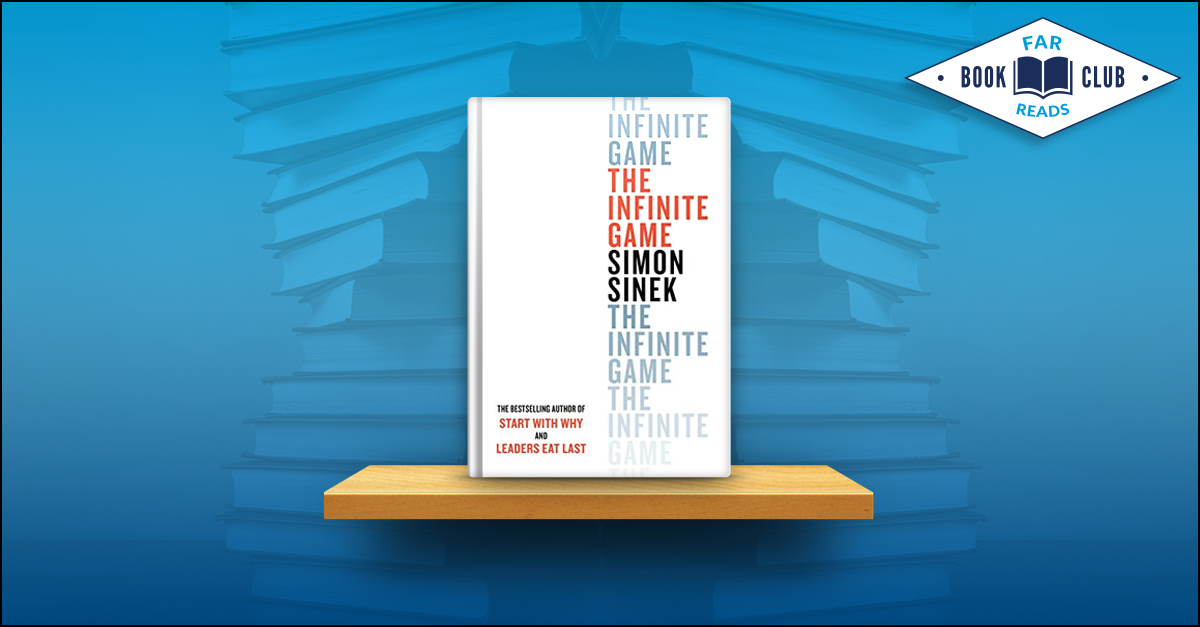
After taking a hiatus from our Far Reads book club in the second half of 2019, we picked it up again earlier this year with Simon Sinek’s latest book, “ The Infinite Game.”
Here’s our recap.
Who Selected It
Jason Greer first mentioned The Infinite Game in a team meeting, and we thought it sounded like the perfect book to get us back into our Far Reads groove.
Why We Picked It
Simon Sinek has had a big impact on our culture. We fully embrace his concept of the Golden Circle—it helped us understand
the importance of articulating our value through more than just a dry description like “software development.” And several of us have read and been inspired by his other books, “ Start with Why” and “ Leaders Eat Last,” so we were excited to learn from him
again with The Infinite Game.
What It’s About
The book distinguishes between finite games—those with known players, fixed rules, and a clear end—and infinite games, in which players can enter and leave at any time, the rules can and do change, and there is no defined end. In finite games
(e.g., basketball or football), determining winners and losers is easy; whoever has the most points when time runs out wins, and at the end of a season the best team is crowned champion. But in infinite games (think politics, business, or parenting),
there are no winners or champions; there is only ahead and behind.
Simon’s premise is that leaders who approach business like a finite game instead of the infinite game it is stifle their companies’ ability to build strong, resilient businesses that will be around for generations.
Lessons Learned
Staying in an infinite game like business, in which the point is not to “win” but to stay in the game, requires all stakeholders—employees, customers, and shareholders—to be inspired enough to persevere through countless challenges,
disruptions, and roadblocks. This kind of perseverance relies on sometimes superhuman effort which can only come from powerful inspiration. Simon calls the source of this inspiration a Just Cause.
A Just Cause is a “specific vision of a future state that does not yet exist; a future state so appealing that people are willing to make sacrifices in order to help advance toward that vision.” It’s through such a powerfully articulated
vision that leaders will inspire the business’s stakeholders to give their discretionary effort and resources to help the business succeed.
What we realized in reading the book is that our vision checks most but not all of the boxes for being a Just Cause. We have some work to do to more clearly articulate how Far Reach’s existence benefits others (our customers, the community, the world).
The book also helped us understand the role finite business metrics like revenue growth and profitability play in infinite-minded companies. Finite goals such as these simply mark our progress throughout an infinite journey. They’re the “fuel
that helps us stay in the game,” so they’re necessary, but they shouldn’t be the focus.
There were many other lessons in the book—way too many to list here—so if you’re at all curious about them, we encourage you to read it for yourself.
Our Favorite Quote
Finite mindsets…“place excessive focus on the urgent at the expense of the important.”
Once again our discussions uncovered several worthy quotes, but this one really hit home, reminding us that we do what we do for more than just money and that we need to remember this when things get crazy or we’re tempted by some potential short-term
gain at the expense of our customers, our team, or our culture.
How We’re Applying What We Learned
The Infinite Game has influenced a lot of things at Far Reach already, including how we identify and talk about our goals, how we treat each other and our customers, and how we work together.
Most importantly, we’re revisiting our vision in an effort to bring it in line with the spirit of a Just Cause. The stories in the book paint a compelling picture of the benefits to be realized by working together toward something bigger than ourselves
and we’re excited to continue our journey down this path.
What’s Next
We’re mixing things up a little for our next reading and splitting in to two groups that will each tackle a different book. One group will delve into teamwork and read, “ Team of Teams: New Rules of Engagement for a Complex World” by General Stanley McChrystal, while the other gets more personal with Brené Brown’s “ Daring Greatly: How the Courage to Be Vulnerable Transforms the Way We Live, Love, Parent, and Lead.”
Be on the lookout for our recaps in a few months. Until then, stay curious, friends!